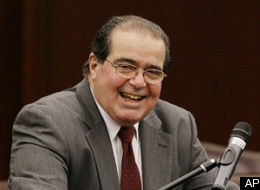"Hitler developed a wonderful automobile,'' Scalia said. "What does that prove?'' "The only thing you can be sure of is the Constitution will mean whatever the American people want it to mean today,'' Scalia said. "And that's not what a Constitution is for. The whole purpose of a constitution is to constrain the desires of the current society." In the first place, the idea that Hitler developed the Volkswagen is somewhat apocryphal, but it's curious that's where Tony's mind went. I agree that whether or not Hitler designed a wonderful automobile seems pretty far removed from the question of whether black students in Kansas in 1954 (and later elsewhere, of course) should have been confined to all-black schools run by the state. I'm just not seeing how Scalia's Hitler point really relates to the argument he was making. The problem, of course, must be mine, because everyone knows how smart Judge Scalia is. I'm pretty sure that Brown vs. Board of Education was based on the Equal Protection Clause of the 14th Amendment to the United States Constitution. Here's the text:  Speaking at a forum recently at the University of Arizona Law School, Justice Antonin Scalia (whom Bush called "Antonio") stated that he probably would have dissented in the landmark case of Brown vs. Board of Education and voted to maintain that stately Southern (and not just Southern, of course) institution known as "separate but equal." According to Antonio, if a state decides to segregate its schools along racial lines, that's well within their rights because the Constitution is "silent" on such a point. His expatiated on his reasoning as follows:
Speaking at a forum recently at the University of Arizona Law School, Justice Antonin Scalia (whom Bush called "Antonio") stated that he probably would have dissented in the landmark case of Brown vs. Board of Education and voted to maintain that stately Southern (and not just Southern, of course) institution known as "separate but equal." According to Antonio, if a state decides to segregate its schools along racial lines, that's well within their rights because the Constitution is "silent" on such a point. His expatiated on his reasoning as follows: Using his "originalist'' philosophy, Scalia said he likely would have dissented from the historic 1954 Brown v. Board of Education decision that declared school segregation illegal and struck down the system of "separate but equal'' public schools. He said that decision, which overturned earlier precedent, was designed to provide an approach the majority liked better.
"I will stipulate that it will,'' Scalia said. But he said that doesn't make it right. "Kings can do some stuff, some good stuff, that a democratic society could never do,'' he continued.Section. 1. All persons born or naturalized in the United States and subject to the jurisdiction thereof, are citizens of the United States and of the State wherein they reside. No State shall make or enforce any law which shall abridge the privileges or immunities of citizens of the United States; nor shall any State deprive any person of life, liberty, or property, without due process of law; nor deny to any person within its jurisdiction the equal protection of the laws.
So here's the first question that comes to my mind under Tony's "originalist" approach: what does "due" mean in the due process clause? It doesn't actually say. I guess a circular approach is all that is left to us. Due process is the process of law that is due to an American citizen. The Sixth Amendment gives us some clues: j
In all criminal prosecutions, the accused shall enjoy the right to a speedy and public trial, by an impartial jury of the State and district wherein the crime shall have been committed, which district shall have been previously ascertained by law, and to be informed of the nature and cause of the accusation; to be confronted with the witnesses against him; to have compulsory process for obtaining witnesses in his favor, and to have the assistance of counsel for his defense.
Justice Tony adds an important caveat: not if you're a Muslim captured by the United States anywhere in the world.
Still, confining the issue to American criminal defendants, suppose the state of Texas decides to streamline its capital punishment process so that defendants, once convicted by a jury, are summarily executed by firing squad the same day. (The Third Reich used this approach, in the unlikely event there was a trial in the first place.) What Constitutional limit stops Texas from doing so? We all know Governor Perry (and George W. Bush, way back when) would prefer this expedited method. Antonio would have to let this one go, too, I'm afraid, just like segregation.
Judges not quite as smart as Scalia concluded back in 1954 that a state which divided up its schools along racial lines, with whites clearly in the majority and in better facilities, created a situation which was "inherently unequal," and one reason for this conclusion was the stigma of segregation itself. Tony went to a private Catholic high school in Manhattan, so it didn't matter all that much to him.
I doubt that the Founding Fathers, even the slave owners, really thought that the purpose of the Constitution was "to constrain the desires of the current society," if that meant that the desire of a society for equal protection should be defeated because we can't find the word "desegregation" in the document itself. It's possible that Enlightenment thinkers such as Thomas Jefferson were even smarter than Antonio, and did not imagine that the Constitution they created would be limited by intellectual gimmicks like "originalism." Indeed, they were smart enough to know they didn't know everything yet, which is why they used general words like "due process" and "equal protection," without attempting to enumerate the precise application of those words to every social situation. They were writing a guideline, not the Encyclopedia Brittanica.


No comments:
Post a Comment